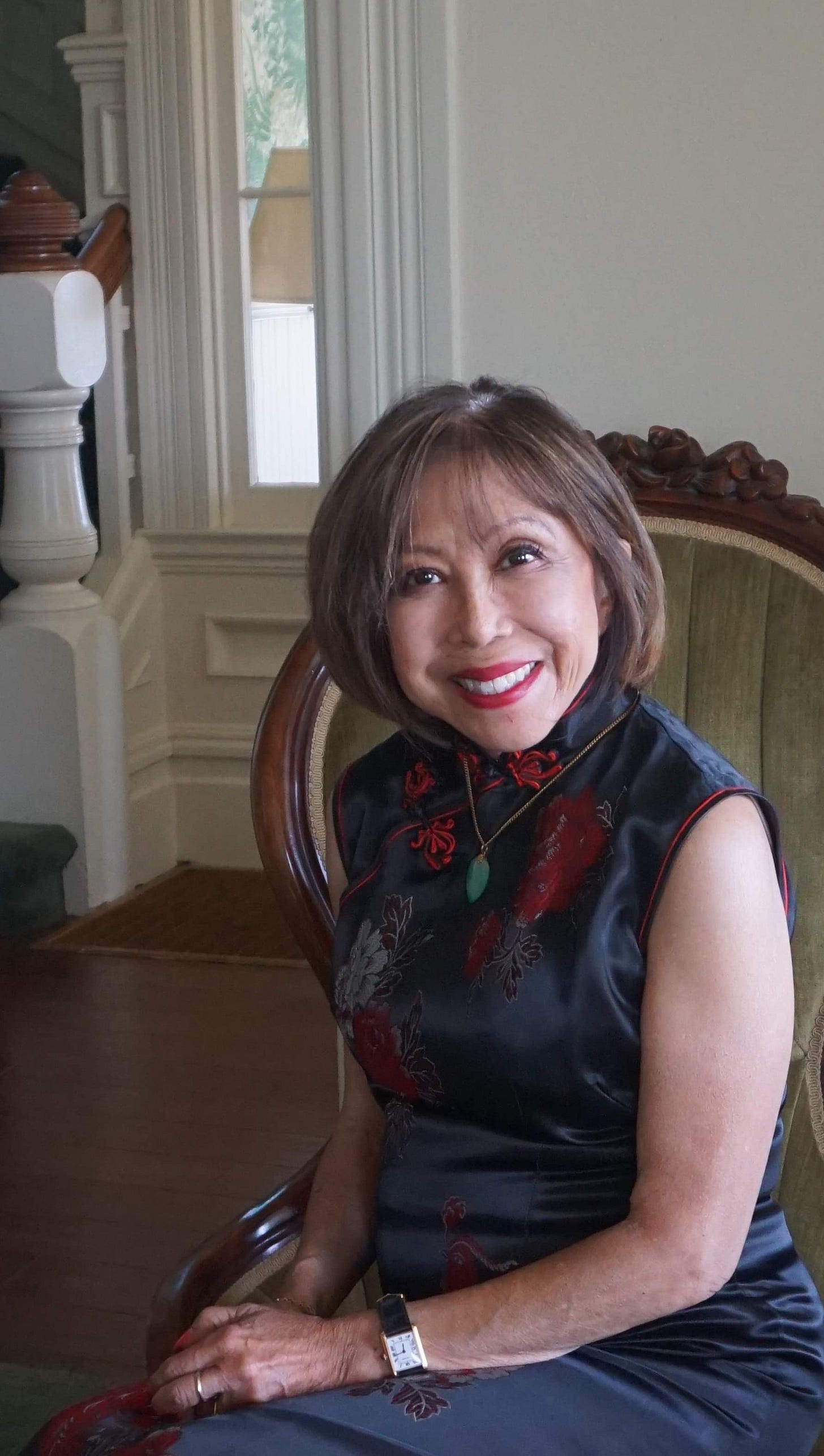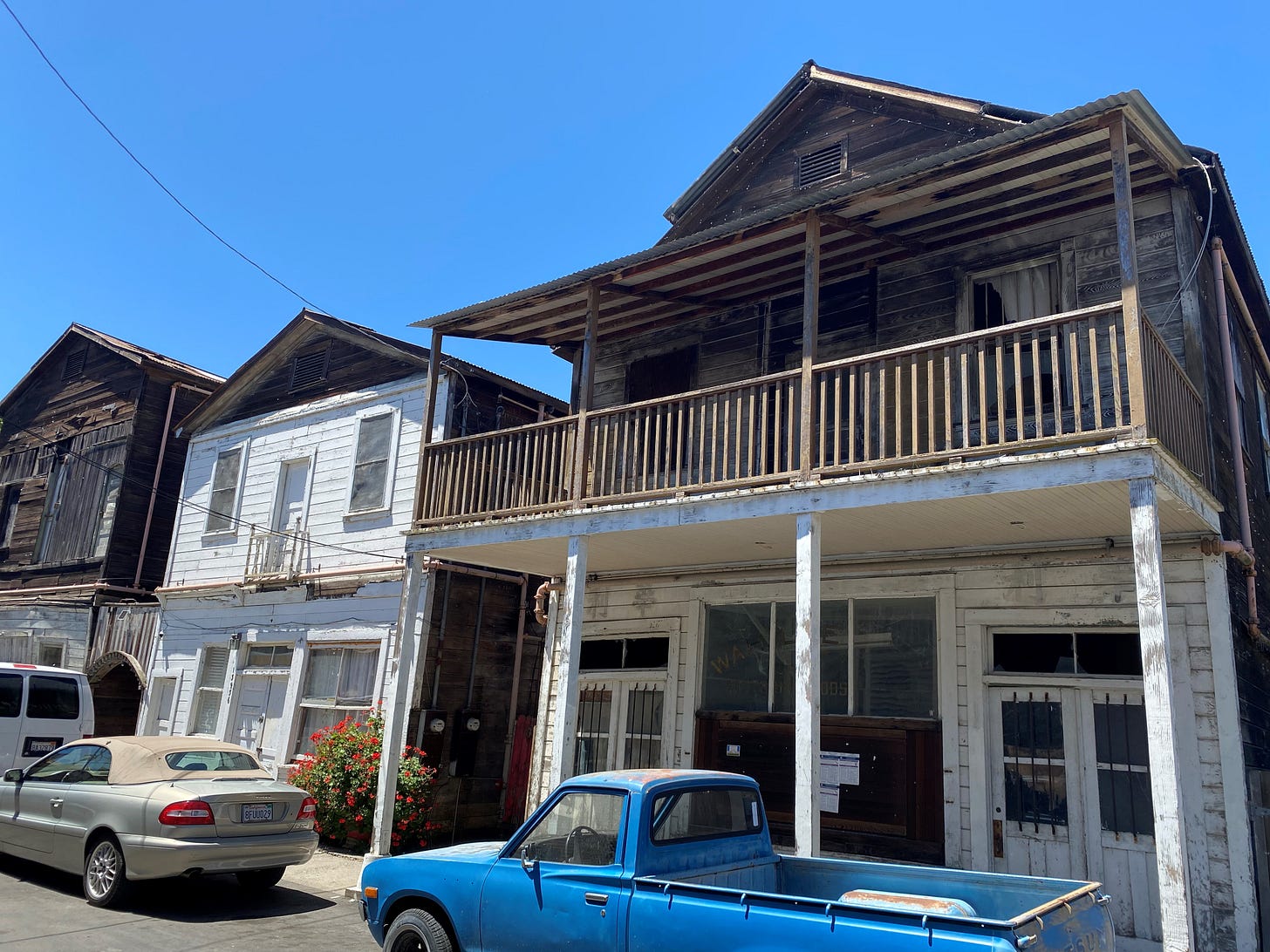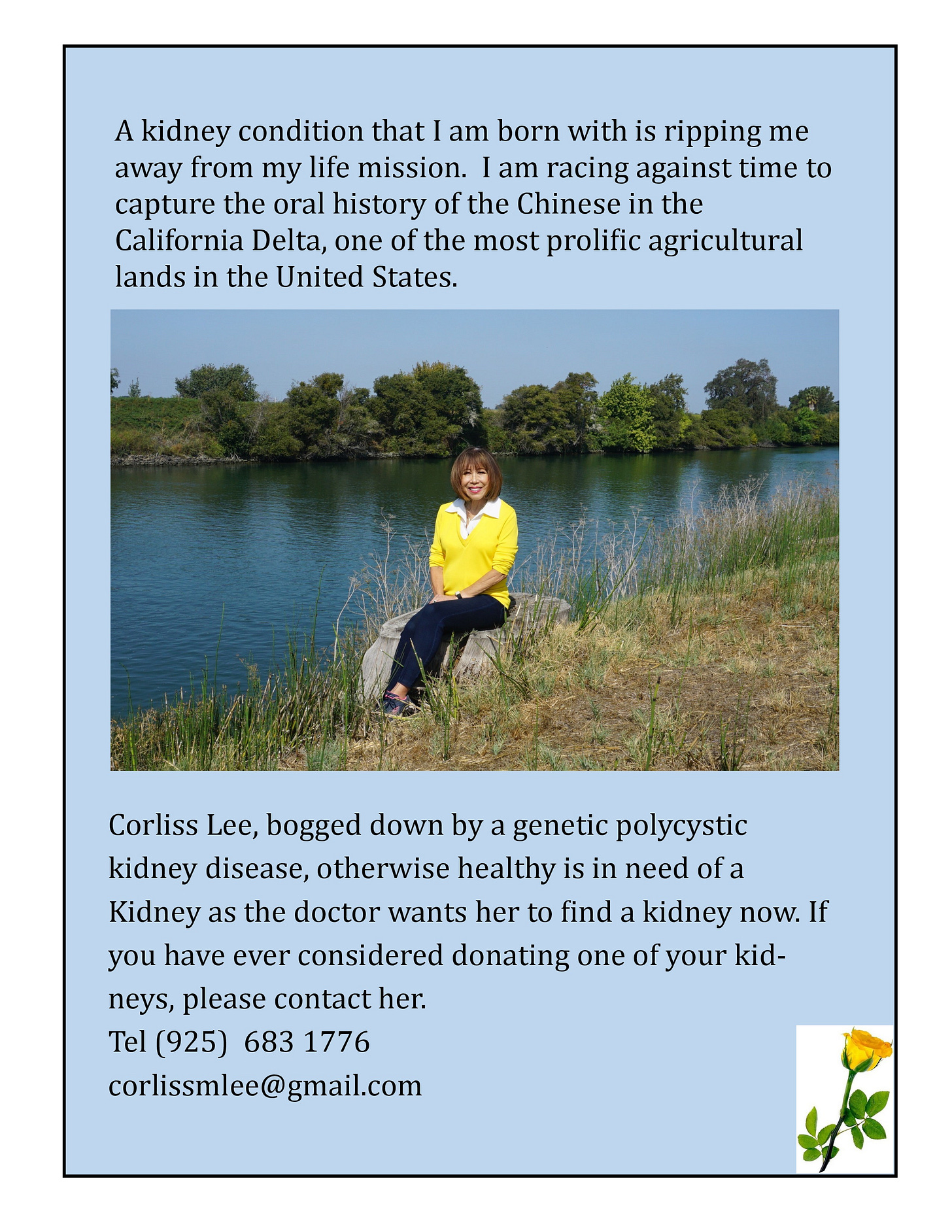Louise Jang Suen
Corliss’s Mother, Louise
Corliss was adopted at birth. Her adopted mother was Louise Jang Suen, the second oldest child of grandma Chow. Being one of the older children meant Louise had to grow up quickly and help her mother take care of younger siblings. One of Louise's daily tasks was to give baths to her young siblings. To conserve hot water, she used the same bath water repeatedly. She later told Corliss that after bathing all her siblings, the bath water was so dirty that she didn't want to take a bath.
When the younger children were old enough to take care of themselves, Louise worked in the packing shed alongside her mother and other women of Locke. They would wrap each pear with paper and box it, making 10 cents for each box that weighted about 50 pounds.
For a while, it seemed that Louise would repeat the kind of life grandma Chow lived. Louise's father arranged for her to marry his friend. Arranged marriage was common for Chinese immigrants back then, and a good Chinese daughter was expected to obey her father's wishes. But Louise was born in the United States and was an independent and strong-willed American woman. She rejected her father's proposal and told him that if he liked the son-in-law he picked, he should marry him.
Louise eventually got married on August 26, 1930, to a man of her choosing, Robert Suen. Their wedding photo showed he was dashing, and she was stunning.
Robert came to the U.S. as a paper son. He learned English quickly and was among the few Chinese immigrants who held managerial positions. He served as a coordinator between Chinese farmer workers and their white employers and ran a gambling house in town. Back then, gambling houses also functioned as social gathering places for mostly single Chinese men to drink tea, eat snacks, read the newspaper, and catch up with the town's gossip.
The couple adopted three children, including Corliss. Louise was neither a good cook nor a homemaker. But she had demonstrated sharp business acumen early on, despite never graduating from high school and growing up in a low-income family. Robert let Louise run his family-owned store, Lim Kee's. The store stood in the middle of Locke's Main Street. Besides selling various goods, including beer, it had a pool table, a soda fountain, and several slot machines. Robert hired two of his cousins to help with household chores and errands at the store so Louise could focus on managing the store.
There were very few women-run businesses back then. For Louise, Locke became a "happy dwelling" because it was where she began to charter a different path than her mother's generation and her own generation.
After a few years, the couple sold the store in Locke and opened a clothing store in Walnut Grove to sell Men's clothing, especially working clothes that farm laborers needed. Louise broke the racial barrier by catering not just to Chinese customers, and she welcomed everyone who walked into her store regardless of skin color. The business flourished under her management, and Louise later doubled its size and added a women's clothing department.
Although she never grew up with fancy clothes due to her modest background, Louise developed a sharp eye for fashion. Every season, she traveled to the San Francisco clothing mart to check out the latest styles and decide what to order for her store. She knew her customers' preferences well and even remembered their children's names and sizes, so she could anticipate what those children might need next year. Her great tailoring skill meant customers would walk out of her store with clothes that fit them well.
Corliss said that one of her happiest memories about her mother was their time at the store. She said, "We laughed all the time and had so much fun helping other women try on clothes."
Louise was a trailblazer in her own right at a time when very few women and even fewer minority women ran businesses of their own. Her entrepreneurship and successes had inspired her two daughters to follow their passion and be strong and resilient. Corliss's older sister later became a project engineer for Boeing and Corliss became a highly accomplished entrepreneur like Louise.
Corliss Suen Lee
Photo of Corliss Suen Lee
Corliss had many sweet memories of growing up in Locke. She felt fortunate to be adopted into a well-to-do family with progressive parents. She took piano and ballet lessons, joined the Girl Scouts, and rode the bike around the town with her friends. The Sacramento River nearby became her and her friends' natural playground.
One thing that was not negotiable with her parents was every day, after attending a regular school in Walnut Grove, she would join her friends to attend the Chinese school in Locke, usually before dinner. The town's residents were constantly worried that they would be deported back to China due to discriminations and immigration restrictions. So they built the one-room school to ensure their kids learned Chinese just in case they had to return to China.
The Chinese school had only one room and one teacher. There were no set curriculums, and the teacher taught kids whatever they knew. The school would have a new teacher every couple of years as the former teacher moved on to other more profitable trades. The new teacher often spoke a different dialect and would teach the kids something utterly different from what they had learned from previous teachers.
The one-room Chinese school in Locke
Still, Corliss was a good student. She graduated as the valedictorian of the Chinese school. She told me that her parents never asked her to study hard and do well in school. It was the kind of expectation embedded in the DNA of all Chinese families that both parents and children understood well without saying it aloud. Children who grew up in Chinese households quickly learned from their parents' examples that whatever you do, work as hard as you can and be the best you can be.
From a young age, Corliss had noticed that, unlike her well-to-do family, many people in the community struggled financially. To make ends meet, men and women worked all the time, often with three or four jobs simultaneously. Not all the kids went to schools like Corliss and her siblings did because some families couldn't afford it and needed their kids to help earn a living.
Feeling guilty about her financial privilege, Corliss took on part-time jobs in the cannery and the packing shed, in her words, "to identify with those hardworking women and girls." Through these experiences, Corliss learned to appreciate and admire Chinese women's strong work ethic and capacity to endure hardship. She remembered that one day, it was 116 degrees inside the cannery, but the Chinese women kept working in this unbearable heat until two passed out due to heatstroke.
These dedicated women inspired Corliss to work hard too. During the harvesting season for pears, she helped pack pears into boxes. Each box weighed about 50 pounds. At the time, Corliss her weighed only 93 pounds. But she had to lift each box of more than half her body weight and drop it off onto the conveyor belt. Corliss said she could only imagine how demanding this work was to her grandma Chow, who was more petite than Corliss was and had worked in the same packing shed for several decades.
Corliss realized these hardworking Chinese women, including her grandmother, played a significant role in Locke's social and economic development. Without them, the community would not have been the same.
When it was time for Corliss to go to college, her mother wanted her to study business. Instead, Corliss chose to study sociology because she thought she could help those low-income families in Locke if she became a welfare worker.
Upon graduation, Corliss discovered that the only job she could find was being a secretary at a real estate development company. Real estate development was pretty much a men's world back then. Corliss applied everything she learned from her grandmother and mother: being strong, confident, and working hard. Over the years, she worked her way up from secretary to vice president.
One day, her supervisor made a pass at her. After Corliss rejected him, he fired her. Sexual harassment wasn't taken as seriously back then as it is now. Lacking legal means to fight back and protect herself, Corliss decided to follow her mother's example and start her own development company.
For decades, Corliss had built homes throughout the Bay Area, Alameda County, and Contra Costa country. Her business success earned her respect from her male colleagues, who elected her as the first female president of the largest division of California's Building Industry Association in 1997.
From grandma Chow to Louise and Corliss, the lives of the three-generation of women of Locke are emblematic of Chinese Americans' experiences. They all overcame adversities in their times and made the most out of their lives. Each generation's struggle and triumph became the inspiration and source of strength for the next.
As its residents embarked on different life journeys, Locke has changed too. Many young people who grew up in Locke left the town for better education and career opportunities elsewhere. Only the old are left behind. With the youth leaving and the state government's crackdown on illegal gambling, Locke's economy gradually declined, and it is no longer a vibrant town like it used to be. As older Chinese residents slowly die out, their stories and the town's history vanish too.
Locke became a National Historic Landmark in 1990. Today Locke is a quiet little town on the bank of the Sacramento River. Only when curious tourists stop by the town will see some commotions. Its Main Street looks like a western movie set because all the houses and storefronts have barely changed since they were first built in the early 20th century. The town is no longer a Chinese town but a multiethnic community. Of the town's 90 or so residents, less than a dozen are Chinese and only one is an original inhabitant of Locke.
Downtown Locke Today
The over 100-years history of Locke and the life stories of its Chinese residents reflect the long and complicated history of Chinese Americans in the United States, defined by adversity, discrimination, poverty, sacrifice, hard work, perseverance, and successes. It is a history that is mostly forgotten and underappreciated, but it is worth telling.
During a trip back to Locke to attend the Spring Festival, Corliss met Douglas Hsia, an immigrant from Hong Kong who fell in love with Locke. Tsai convinced her to get involved with preserving the town's unique history. Given the rise of anti-Asian hate crimes in recent years and Chinese Americans are often seen as perpetual foreigners in America, it is even more important to educate the public about the history and contributions of Chinese Americans.
Inspired by Douglas' passion, Corliss moved back. She is currently heading the Oral History Committee of the Locke Foundation. She and other committee members are racing against time to interview past and present residents and families of the Delta region. They have done more than two dozen interviews and plan to do at least two dozen more. They hope these interviews will preserve Locke's history and the stories of Chinese Americans for future generations.
Before leaving Locke, I asked Corliss if she had any parting wisdom for young Chinese Americans like myself. She said, "Life is a journey that sometimes can be very difficult and even tormenting. One of the biggest lessons we learn from our grandmothers and mothers is — keep going no matter how difficult the journey is. Never give up. Never stop. Eventually, you can come out of it and be successful."
Note: Thanks Corliss for sharing her family stories with me. I appreciate everything she does to preserve Locke’s history and Chinese immigrants’ experiences in the Delta region. Recently, I learned that Corliss needs help. Please check out the announcement below and share it as widely as possible. I pray Corliss will get the help she needs. Thank you.










Share this post